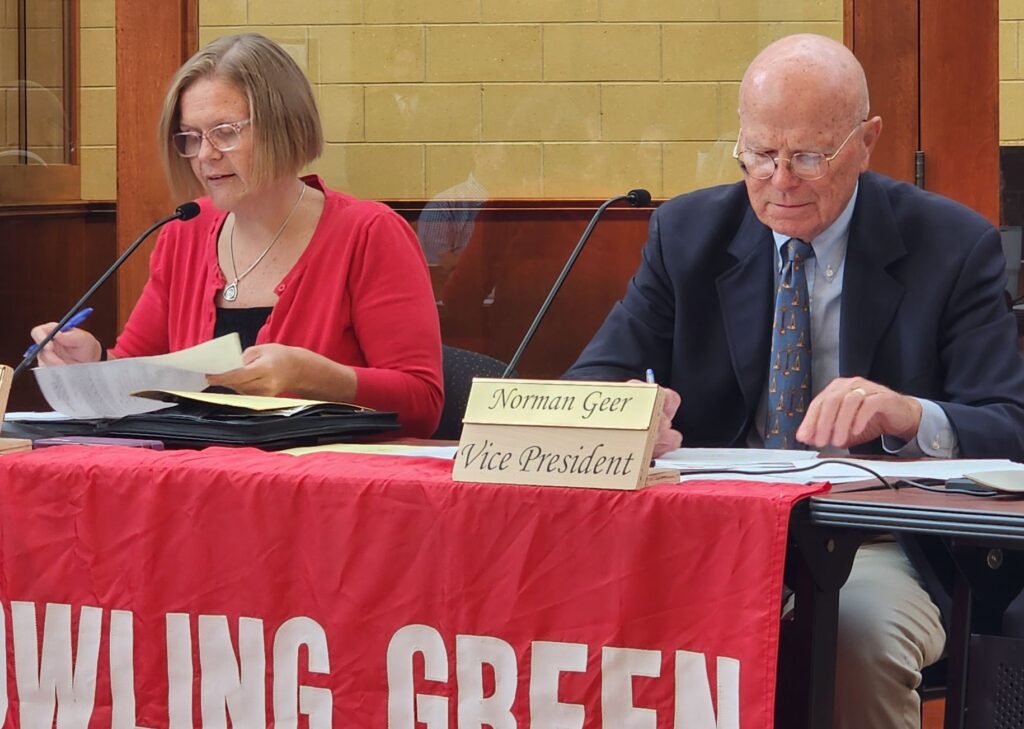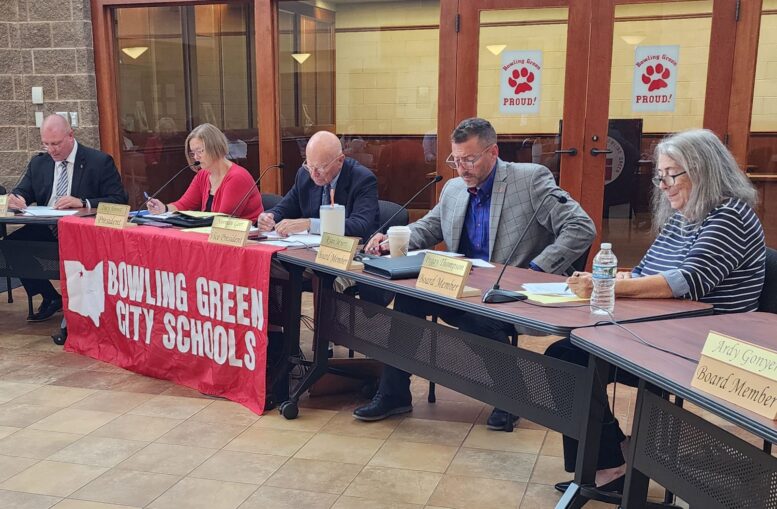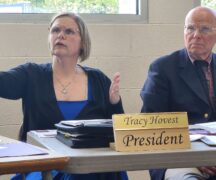BY JAN McLAUGHLIN
BG Independent News
After going 14 years without asking voters for more operating funds, the Bowling Green Board of Education passed a resolution on Tuesday to put an income tax on the November ballot.
BG City School District has been operating with an income tax of 0.5% – one of the lowest in the state, according to incoming district treasurer Matt Feasel.
But with deficit spending looming in the near future, the board decided now is the time to ask for more.
Voting in favor of putting the income tax on the ballot were Tracy Hovest, Norm Geer and Ryan Myers. Ardy Gonyer was not present at Tuesday’s meeting, but at last month’s meeting voted in support of the income tax increase.
They all cited the need to prevent the district from going into the red and to stave off cuts to services for students.
The lone “no” vote came from Peggy Thompson, who said she has heard complaints from taxpayers about a potential income tax increase.
“I think we’re just asking for too much, too soon,” Thompson said. “People who are talking to me are tired. They want a breather.”

But Hovest, the board president, stressed that the income tax increase shouldn’t come as a surprise to anyone, since the board has been forecasting the need for more operating funds for years.
“We’ve been good stewards of taxpayer money,” Hovest said.
And waiting longer would have dire effects, she added.
“Things aren’t getting any cheaper,” Hovest said.
Income taxes collected for school districts can only be implemented in quarter percentages. So the district’s options to raise more operating funds are income taxes at 0.25%, 0.5%, 0.75% or 1%.
Feasel explained at the June meeting that because of the delayed collection of income taxes by the state, putting a 0.25% income tax on the ballot will not give the district enough revenue to prevent deficit spending. A 0.5% income tax will still do too little to buoy the budget. A 1% income tax would be nice, but unlikely to garner voter support.
“You have to look at what’s responsible to the voters in the district,” Feasel said in June.
The 0.75% income tax would lift the district away from deficit spending, while allowing the district to keep its programming and current staffing levels.
Feasel cautioned that income tax revenue does not reach its maximum until three years after the levy is passed – so it’s not a quick fix.
Hovest noted that the board has been working on financial stability for years.
“This has been the plan. We’re not springing this on anybody,” Hovest said at June’s meeting. “We’ve been talking about it for the past four years.”
Haselman has said he was aware before he took the superintendent job with the district that a new levy would be needed.
“I think it’s impressive we went 14 years” with no new operating money, he said last month. “That’s a long time.”
The hope is that the district will regain some of its enrollment as people see the changes with new leadership and a new high school on the way.
Board member Norm Geer said a request for income tax provides a balance with the property tax already in place. And as incomes go up, so will the district’s revenue.
The board agreed that the income tax increase should be for a continuing period.
“We’ll be back in the same boat, asking for more in five or six years,” if it’s not a continuing levy, Hovest said.
Feasel agreed.
“Continuing is the way to go,” he said at the June meeting. “To be constantly on the ballot in schools is difficult.”
But Thompson, at the last meeting, suggested the district look for “some waste” to trim to keep the district in the black.
“They are tired of everybody asking for more money,” Thompson said of local residents.
Hovest pointed out that waiting till next year to seek funding will require one of two actions – neither good – of making cuts and asking voters for even more money.
Last month, Hovest acknowledged that 80-90% of operations funds pay for personnel.
“I won’t apologize for that,” she said of investing in good staff. “I don’t want to go backwards and I don’t want to cut services.”
Following an executive session Tuesday evening, the school board voted to give a 2% raise to Haselman, who was hired as superintendent last summer with an annual salary of $155,000.





